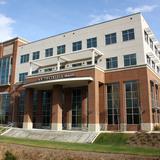- A-B Tech, the community's College, is dedicated to student success. As a comprehensive community College, A-B Tech is committed to providing accessible, quality educational opportunities for lifelong learning to meet the diverse and changing needs of our community.
School Highlights
Asheville-Buncombe Technical Community College serves 9,275 students (22% of students are full-time).
The college's student-teacher ratio of 14:1 is higher than the state community college average of 13:1.
Minority enrollment is 28% of the student body (majority Hispanic), which is less than the state average of 48%.
Quick Facts (2026)
- Enrollment: 9,275 students
- In-state tuition: $2,033
- Out-state tuition: $7,396
- Student-teacher ratio: 14:1
- Minority enrollment: 28%
- Source: Integrated Postsecondary Education Data System (IPEDS)
Top Rankings
Asheville-Buncombe Technical Community College ranks among the top 20% of public schools in North Carolina for:
School Overview
The teacher population of 645 teachers has stayed relatively flat over five years.
Asheville-Buncombe Technical Community College
(NC) Community College Avg.
Carnegie Classification
Associate's Colleges: Mixed Transfer/Career & Technical-High Nontraditional
Associate's Colleges: Mixed Transfer/Career & Technical-High Nontraditional
Institution Level
At least 2 but less than 4 years
At least 2 but less than 4 years
Institution Control
Public
Public
Total Faculty
645 staff
256 staff
School Calendar
Student Body
The student population of Asheville-Buncombe Technical Community College has grown by 40% over five years.
The student-teacher ratio of 14:1 has decreased from 25:1 over five years.
The Asheville-Buncombe Technical Community College diversity score of 0.46 is less than the state average of 0.66. The school's diversity has grown by 30% over five years.
Total Enrollment
9,275 students
2,579 students
Student-Teacher Ratio
14:1
13:1
# Full-Time Students
2,082 students
766 students
# Part-Time Students
7,193 students
1,813 students
# Enrollment Undergraduate
927 students
316 students
# Full-Time Undergraduate Students
2,082 students
766 students
# Full-Time Graduate Students
n/a
22 students
# Part-Time Undergraduate Students
7,193 students
1,990 students
# Part-Time Graduate Students
n/a
3 students
Total Dormitory Capacity
n/a
717 students
% American Indian/Alaskan
n/a
1%
% Asian
2%
3%
% Hispanic
13%
13%
% Black
6%
21%
% White
72%
52%
% Hawaiian
n/a
1%
% Two or more races
3%
3%
% Non Resident races
n/a
1%
% Unknown races
3%
5%
Diversity Score
0.46
0.66
College Completion Rate (Students who graduate in less than 4 years)
31%
37%
College Completion Rate (Students who graduate in 4 years or more than 4 years)
n/a
43%
Average Graduate Earnings (10 Years)
$31,400
$27,500
Tuition and Acceptance Rate
The public in-state tuition of $2,033 is less than the state average of $3,915. The in-state tuition has declined by 22% over four years.
The public out-state tuition of $7,396 is less than the state average of $9,508. The out-state tuition has declined by 15% over four years.
In-State Tuition Fees
$2,033
$3,915
Out-State Tuition Fees
$7,396
$9,508
Tuition Notes
$1,216.00 for NC Residents; $4,288.00 for Non-residents
% Students Receiving Some Financial Aid
64%
82%
Median Debt for Graduates
$15,520
$11,865
Median Debt for Dropouts
$9,500
$5,846
Acceptance Rate
n/a
82%
SAT Reading
n/a
488
SAT Math
n/a
498
ACT Composite
n/a
20
ACT English
n/a
13
ACT Math
n/a
16
Source: 2024 (or latest year available) Integrated Postsecondary Education Data System (IPEDS) , School Administrators
School Notes
- Asheville-Buncombe Technical Community College has served as the community's premier technical educator for many years. Originally funded by a bond election, the institution was established Sept. 1, 1959, and named the Asheville Industrial Education Center. Following legislation creating the North Carolina System of Community Colleges that was enacted in 1963 by the General Assembly, the name was changed on Jan. 27, 1964, to Asheville-Buncombe Technical Institute. This legislation enabled the College to confer the Associate in Applied Science degree for the first time at graduation ceremonies in August 1964. The College offers the Associate in Arts, the Associate in Science, and the Associate in Applied Science degrees, diplomas, and certificates. The Associate in Arts and Associate in Science degree programs are offered in the Division of Arts and Sciences. All career curricula and courses are offered through three divisions: Allied Health and Public Service Education, Business and Hospitality Education, and Engineering and Applied Technology. In addition, noncredit academic, avocational, practical skills, and occupational classes and activities are offered through the Continuing Education Division. Continuing Education courses includes Adult Basic Education, Human Resources Development, New and Expanding Industry Training, Small Business Center, Total Quality Management, and Focused Industrial. More than 25,000 students are enrolled in curriculum and continuing education courses, giving us the largest headcount of any college or university in Western North Carolina. Yet despite our size, we offer small classes, averaging 16 students per instructor in our two-year degree and one-year diploma programs. The main campus is located off Victoria Road in Asheville, North Carolina, a city repeatedly named as one of the most livable towns in America. The Madison Campus is located in Marshall, NC. The Enka Campus is located in the Enka community near Asheville, NC.
Frequently Asked Questions
How much does Asheville-Buncombe Technical Community College cost?
Asheville-Buncombe Technical Community College's tuition is approximately $2,033 for In-State students and $7,396 for Out-State students.
What is Asheville-Buncombe Technical Community College's ranking?
Asheville-Buncombe Technical Community College ranks among the top 20% of community college in North Carolina for: Least expensive tuition and Largest student body.
Recent Articles

How to Transfer to a Four-Year University Without Losing Credits
Learn how to transfer to a four-year university without losing credits in 2026, including agreements, planning tips, and expert guidance.

First-Generation Student Guide to Community College Success
A first-generation student guide to navigating your first semester at community college, with academic, financial, and campus life strategies.

Most In-Demand Community College Majors for 2025–26
Explore the most in-demand community college majors for 2025–26 workforce needs, aligned with hiring trends, wages, and transfer pathways.







